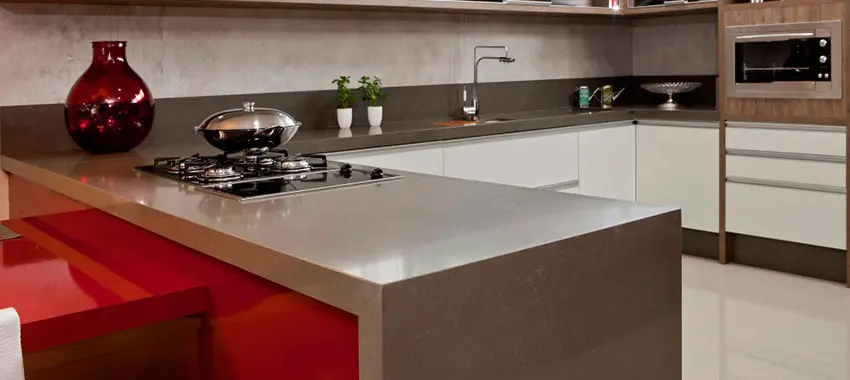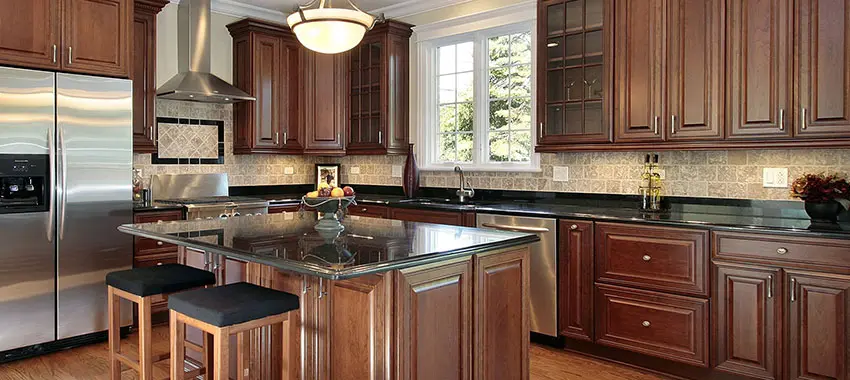Jan
Why Quartz Countertops Are A Bad Choice For Outdoor Kitchens?
- 2024
- FlintStoneTops
Quartz seems to be the titan of the countertops realm, with its unmatched durability, excellent longevity, and overall performance. But is this countertop material good for outdoor kitchen just as granite countertops are? Well, let’s see if quartz can handle the giant fireball, aka the sun.
Yes, Quartz Is Not Fit For The Outdoors
If you were thinking about building an outdoor kitchen and keeping quartz countertops in the blazing sunlight, then you might want to take a step back and rethink. Quartz countertops, even though they’re amazing for indoors and there aren’t a lot of stones that can match the qualities quartz has, are still not good for outdoor kitchens.
Why, you ask? Well, it’s going to fade away quickly in the sunlight and it will not look as appealing as it did before. Some things just aren’t meant for use in the sun, and quartz is one of them.
UV Light Damage
The main culprit that inflicts damage on quartz countertops is the sun’s rays. The UV rays of the sun are as bad for the countertops as they are for humans and their skin. Same with skin, if you keep the countertops outside for too long, they’re going to become dull and fade in color and in some cases, the quartz can become very brittle and fragile. So, it’s best that you don’t use them outside at all.
Minimal sunlight is alright, but anything too direct and exposed for too long can turn your beautiful quartz countertops into an ugly faded mess. UV rays from the sun affect the resin and pigments of the quartz countertops making them extremely dark and splotchy on the surface.
Shade Is Necessary
If you want to install quartz countertops outside, then you need to keep them in the shade. Direct sunlight isn’t good for anything, especially when it’s not protected properly. So, proper shade will be the safest option, however, it won’t guarantee that the countertops will remain in pristine condition as they would if they’re inside. This is mostly a last resort if you’re dead set to install quartz countertops in your outdoor kitchen.
Light Quartz Vs Dark Quartz
Another way by which you can suppress the damage of quartz countertops in sunlight is by getting lighter-colored quartz. Darker quartz can react more violently with sunlight and the pigment and resin combination can lose its potency way faster than its lighter-colored counterpart.
Dark quartz will also show the damages prominently whereas lighter quartz is a lot more forgiving. So, if you want to bite the bullet and get quartz countertops for the outdoor grill or kitchen, then consider lighter colors because they’re going to last a bit longer.
It’s Not Heat Resistant
If you didn’t know this already, quartz is not a naturally heat-resistant material. Quartz is an engineered stone and it’s made by combining and sealing resin with pulverized rocks and pigment, which gives the stone its characteristic appearance. Almost all man-made stones have bad heat resistance.
Nothing matches the heat resistance of natural stones because they’re made naturally inside the ground where the temperatures are astronomically high and the pressures are unbearable. You can’t expect quartz to match anywhere near this quality of natural stones. This is also another major reason why quartz doesn’t last as long in sunlight and it gets faded.
Amazing Qualities Of Quartz Countertops But Not For The Outdoors
Quartz can’t last in the sunlight. So what? The material itself is not bad. Quartz is still a very durable and reasonable material that will make wonderful and long-lasting countertops for indoor kitchens. Here are some qualities of quartz that are make it so popular.
Durable
Quartz is a highly durable material. It can last anywhere between 15 to 30 years if you take good care of the surface. Buying quartz countertops is a one-time investment and you will not regret this purchase because it’s going to pay off. This is why it’s a fan favorite among people.
Comparatively Affordable
Quartz is not as expensive as other materials. Natural stones, even though they also have amazing qualities, just aren’t as affordable as quartz and if you compare them with the qualities and things quartz has to offer, then you’ll know exactly which choice is better.
People can justify the cost of quartz, because it’s durable and doesn’t need a lot of maintenance whereas some natural stones are also durable but they need more maintenance than quartz.
Quartz countertops don’t need to be sealed every few years. You can set it and forget it because these bad boys are going to stay put for as long as you want.
Easy To Clean
There aren’t a lot of countertops that can match this quality of quartz. Let’s face it; no one wants to slave over kitchen countertops with a washcloth at all times. So, it’s comforting to know that quartz won’t put you through this trouble at all. It’s truly a magnificent material that requires little to no maintenance.
You just need to take care of daily cleaning and getting the countertops polished every year or so, and you’re pretty much set for a long time. Now that’s what you can call “low-maintenance”.
Better Alternatives To Use In Outdoor Kitchens
If you’re looking for countertop alternatives to use outside, then these options are going to be the best:
Granite Countertops
Lo and behold! Granite is a stone that knows no damage, especially the one inflicted by the blazing sun. Granite has a very high heat resistance which is not a quality you see in a lot of stones and it can take the heat of the sun like a champ.
There’s no need for you to worry about discoloration, fading, or damage to the countertops because granite can endure temperatures and harsh weather with finesse, so your kitchen will always look dazzling as long as you seal and maintain it properly.
Porcelain Slab Countertops
Porcelain is another great option to use outdoors. This material is also very shiny and it has a very opulent feel to it. So, the kitchen will feel glossy and luxurious. One thing that you need to keep in mind about porcelain slabs, is the fact they are not waterproof. You will need to seal them to protect the beautiful countertops from food stains and moisture.
This is the only drawback of this seemingly perfect material, and other than that, porcelain works like a wonder in an outdoor kitchen. If you like tiles, you also get a porcelain tile countertop that is waterproof.
Concrete Countertops
This option is great for all of you lovers of rugged countertops out there. Concrete is a very popular countertop material choice for outdoor kitchens. It’s appealing, it has that rustic appeal to it and it doesn’t need to be colored or stained whatsoever because the natural color of concrete doesn’t fade away in the sunlight. And the countertop will be as durable as the walls of the kitchen.
The only downside is that this material is extremely porous and it can absorb water, among other things, like a literal sponge. So, this makes sealing necessary because you not only want to protect the countertops from water damage, but infestation of bacteria and viruses too.
Conclusion
Quartz countertops are not fit for outdoor kitchens. Looks like it’s a score for the sun and a loss for quartz. But you can use granite countertops that are also extremely popular. Discuss it more with a granite installer Rockville.



